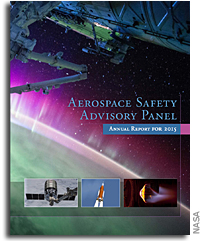NASA Aerospace Safety Advisory Panel Annual Report 2015

Over the past year, the Panel has noted a continuing and unacknowledged accretion of risk in space flight programs that we believe has the potential to significantly impact crew safety and the safe execution of human space missions. The Panel’s concern is not the result of singular action but the accumulated impact of decisions made and risks assumedeither explicitly or tacitly, in small or large stepsthat have mounted up and led to an apparent erosion of safety. While the ASAP does not assume that a challenging endeavor such as space exploration can be undertaken free of risk, we have consistently stated that, in a healthy, risk-management environment, risks should be deliberately and thoroughly vetted, balanced against the expected gain from taking the risk, and acknowledged candidly and with clear accountability and documentation.
While the programs appear to recognize and accept risk growth in many individual situations, we are not convinced that NASA recognizes or clearly communicates the aggregated impact of individually accepted component risks. Despite the ASAP’s long-standing recommendation, NASA is not clearly and transparently communicating the recognition of the accreted risk, its impact to overall safety, and the rationale of why the increased risk is acceptable. This leaves the ASAP uncertain as to whether this accretion of risk is prudent or not. In some situations, NASA has characterized the changes as negligible and portrayed them as necessary and prudent actions that must be taken to maintain a schedule that appears to us to be an overly restrictive and internally imposed constraint.
We are concerned that without clearly defined acceptance of risk that takes into consideration and documents all alternatives and the potential consequences of the assumed risk, the likelihood of successful and safe execution of NASA’s human space flight mission will be diminished. This situation can also become detrimental to sustaining a safety culture that encourages free and open dialog concerning risk among all Agency levels. In addition, it can unfavorably impact the perception of and confidence in NASA. The Panel has raised this issue of risk accretion and acceptance in previous Annual Reports but unfortunately has not noted improvement. In fact, the unacknowledged accumulation of risk appears to be increasing.








